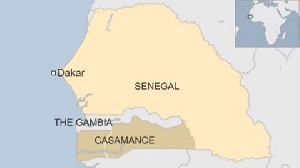
The Casamance region has been restive for years
DAKAR, Feb 13 (NNN-AGENCIES) — A military offensive in Senegal’s southern region of Casamance has thrown separatist rebels on the back foot, raising the prospect that one of Africa’s oldest conflicts may finally end.
Thousands have died since the Casamance Movement of Democratic Forces (MFDC) began its fight for independence in 1982.
The poor region had returned to an uneasy calm in recent years.
But Senegal, supported by neighbouring Guinea-Bissau, suddenly launched an offensive on Jan 26, claiming the capture of several bases in the huge Blaze forest and forcing the rebels to fall back.
Army officers led media on a tour of the captured bases and displayed dilapidated items they had captured, including mortars, rusty rifles, and kitchen utensils.
An MFDC fighter who fled to Guinea-Bissau after the offensive said that the rebels were poorly equipped. “We withdrew because we could not face the firepower of the Senegalese army,” he said.
The operation against the rebel forest bases began with artillery fire and ended with a ground offensive, which had air support, according to an army officer who requested anonymity.
Senegal’s army says the latest operation aimed at stopping alleged rebel exactions on civilians and helping displaced people return home.
The conflict has rumbled on at a low level for several years, with occasional flareups.
In 2018, 14 young men were slaughtered in execution style-killings north of the regional capital Ziguinchor.
Another aim is to curb the illegal cannabis and timber trade, which Casamance separatists are thought to control.
Casamance, home to 1.9 million people, was once part of Portugal’s colonies in West Africa, along with what today is Guinea-Bissau.
Adding to this historical distinction is Casamance’s location.
It is almost separated from the rest of Senegal by The Gambia – a remoteness that fed into perceptions of discrimination by the government in far-off Dakar and helped create an independence movement that erupted into violence in 1982.
As well as improved military capabilities, a realignment in West African politics may have played into Senegal’s hands.
The Gambia had long been accused of aiding the rebels, for example. But Gambian President Adama Barrow, who came to power in 2017, is considered close to Senegalese President Macky Sall.
Guinea-Bissau has faced similar accusations. But Umaro Sissoco Embalo, another ally of Sall’s, took office in the former Portuguese colony last year.
The rebels are still believed to have bases in the Ziguinchor region and near the Gambian border.
Colonel Souleymane Kande, one of Senegal’s military commanders in Casamance, nonetheless said he thought some MFDC factions “are ready to lay down their arms”.
He added that soldiers would remain on the captured bases and any rebel exactions on civilians “will be viewed as a declaration of war.” — NNN-AGENCIES






